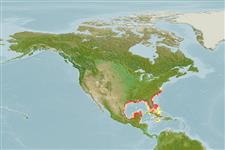Environment: milieu / climate zone / depth range / distribution range
ນິເວດວິທະຍາ
ສັດທະເລ; ນ້ຳຈືດ; ນ້ຳກ່ອຍ ອາໄສຢູ່ໃກ້ໜ້າດິນໃຕ້ພື້ນທ້ອງນ້ຳ; ລະດັບຄວາມເລິກ 2 - 25 m (Ref. 55207), usually 2 - 6 m (Ref. 55207). Subtropical; 39°N - 17°N, 100°W - 75°W (Ref. 55207)
Western Atlantic: Chesapeake Bay to southern Florida in the USA and the Gulf of Mexico. Records from South America doubtful (Ref. 7251).
Length at first maturity / ຂະໜາດ / ນ້ຳໜັກ / Age
Maturity: Lm 22.0, range 22 - 23 cm
Max length : 61.0 cm WD ຕົວຜູ້/ບໍ່ມີເພດ; (Ref. 6902); common length : 27.0 cm WD ຕົວຜູ້/ບໍ່ມີເພດ; (Ref. 6902); common length :39 cm WD (female); ນ້ຳໜັກສູງສຸດທີ່ເຄຍຈັດພີມມາ: 4.9 kg (Ref. 40637)
Prominent triangular snout. Broadly rounded outer corners of disc. Upper surface brown or yellowish brown, paler toward margins of disc. Lower surface white (Ref. 6902). Few scapular spines. Middorsal row of spines present, but few on tail beyond pelvic fins (Ref. 7251).
Adults inhabit coastal waters, including estuaries and lagoons (Ref. 12951) and ascend rivers (Ref. 12951). They feed on tube anemones, polychaete worms, small crustaceans, clams, and serpent stars (Ref. 12951). Ovoviviparous (Ref. 50449). Parturition occurs in July and August (Ref. 27549). Litters of 2-3 pups; gestation 4 months (Ref. 114953).
Life cycle and mating behavior
ການຈະເລີນເຕັມໄວ | ການສືບພັນ | ການວາງໄຂ່ | ໄຂ່ | ຄວາມດົກຂອງໄຂ່ປາ | ຕົວອ່ອນ
Exhibit ovoviparity (aplacental viviparity), with embryos feeding initially on yolk, then receiving additional nourishment from the mother by indirect absorption of uterine fluid enriched with mucus, fat or protein through specialised structures (Ref. 50449). Distinct pairing with embrace (Ref. 205).
Robins, C.R. and G.C. Ray, 1986. A field guide to Atlantic coast fishes of North America. Houghton Mifflin Company, Boston, U.S.A. 354 p. (Ref. 7251)
IUCN Red List Status (Ref. 130435: Version 2024-1)
Threat to humans
Harmless
Human uses
ການປະມົງ: ທີ່ບໍ່ມີຄວາມສົນໃຈ
ເຄື່ອງມື
Special reports
Download XML
ແຫຼ່ງອີນເຕີເນັດ
Estimates based on models
Preferred temperature (Ref.
123201): 23.2 - 27, mean 25.5 °C (based on 272 cells).
Phylogenetic diversity index (Ref.
82804): PD
50 = 0.5039 [Uniqueness, from 0.5 = low to 2.0 = high].
Bayesian length-weight: a=0.00468 (0.00195 - 0.01123), b=3.12 (2.92 - 3.32), in cm total length, based on LWR estimates for this (Sub)family-body shape (Ref.
93245).
ຊັ້ນເຂດຮ້ອນ (Ref.
69278): 3.5 ±0.42 se; based on food items.
ຄວາມຢືດຢຸ່ນ (Ref.
120179): ຕຳ່ຫຼາຍ, ປະຊາກອນຕຳ່ສຸດທີ່ໃຊ້ເວລາສອງເທົ່າຫຼາຍກວ່າ 14 ປີ (K=0.26-0.31; Fec assumed <10).
Fishing Vulnerability (Ref.
59153): Very high vulnerability (90 of 100).
Nutrients (Ref.
124155): Calcium = 15.8 [2.1, 309.7] mg/100g; Iron = 0.739 [0.068, 8.595] mg/100g; Protein = 22.3 [20.0, 24.4] %; Omega3 = 0.199 [0.062, 0.591] g/100g; Selenium = 14.8 [2.7, 68.8] μg/100g; VitaminA = 6.9 [0.6, 69.4] μg/100g; Zinc = 0.726 [0.053, 8.530] mg/100g (wet weight); based on
nutrient studies.
